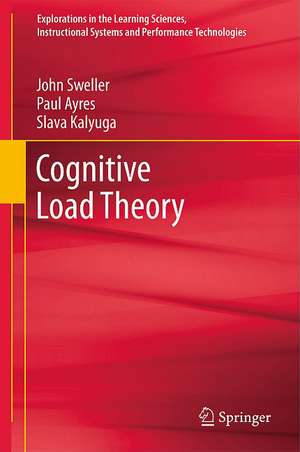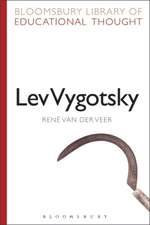Cognitive Load Theory: Explorations in the Learning Sciences, Instructional Systems and Performance Technologies, cartea 1
Autor John Sweller, Paul Ayres, Slava Kalyugaen Limba Engleză Hardback – 30 mar 2011
The theory can be divided into two aspects that closely inter-relate and influence each other: human cognitive architecture and the instructional designs and prescriptions that flow from that architecture. The cognitive architecture is based on biological evolution. The resulting description of human cognitive architecture is novel and accordingly, the instructional designs that flow from the architecture also are novel. All instructional procedures are routinely tested using randomized, controlled experiments.
Roughly 1/3 of the book will be devoted to cognitive architecture and its evolutionary base with 2/3 devoted to the instructional implications that follow, including technology-based instruction. Researchers, teachers and instructional designers need the book because of the explosion of interest in cognitive load theory over the last few years. The theory is represented in countless journal articles but a detailed, modern overview presenting the theory and its implications in one location is not available.
Preț: 1113.89 lei
Preț vechi: 1358.41 lei
-18% Nou
Puncte Express: 1671
Preț estimativ în valută:
213.14€ • 223.13$ • 176.36£
213.14€ • 223.13$ • 176.36£
Carte tipărită la comandă
Livrare economică 07-21 aprilie
Preluare comenzi: 021 569.72.76
Specificații
ISBN-13: 9781441981257
ISBN-10: 144198125X
Pagini: 250
Ilustrații: XVI, 274 p. 20 illus.
Dimensiuni: 155 x 235 x 32 mm
Greutate: 0.59 kg
Ediția:2011
Editura: Springer
Colecția Springer
Seria Explorations in the Learning Sciences, Instructional Systems and Performance Technologies
Locul publicării:New York, NY, United States
ISBN-10: 144198125X
Pagini: 250
Ilustrații: XVI, 274 p. 20 illus.
Dimensiuni: 155 x 235 x 32 mm
Greutate: 0.59 kg
Ediția:2011
Editura: Springer
Colecția Springer
Seria Explorations in the Learning Sciences, Instructional Systems and Performance Technologies
Locul publicării:New York, NY, United States
Public țintă
ResearchCuprins
<P>Introduction to the issues addressed by cognitive load theory.- Categories of information: What is learned based on an evolutionary perspective.- Human cognitive architecture.- Categories of cognitive load and measuring cognitive load.- Instructional effects associated with intrinsic cognitive load. -Instructional effects associated with extraneous cognitive load.- The consequences of cognitive load theory for debates on the advantages and disadvantages of minimal guidance during instruction.- Future directions and unresolved issues.</P>
Textul de pe ultima copertă
Cognitive Load Theory
John Sweller, Paul Ayres, Slava Kalyuga
Effective instructional design depends on the close study of human cognitive architecture—the processes and structures that allow people to acquire and use knowledge. Without this background, we might recognize that a teaching strategy is successful, but have no understanding as to why it works, or how it might be improved.
Cognitive Load Theory offers a novel, evolutionary-based perspective on the cognitive architecture that informs instructional design. By conceptualizing biological evolution as an information processing system and relating it to human cognitive processes, cognitive load theory bypasses many core assumptions of traditional learning theories. Its focus on the aspects of human cognitive architecture that are relevant to learning and instruction (particularly regarding the functions of long-term and working memory) puts the emphasis on domain-specific rather than general learning, resulting in a clearer understanding of educational design and a basis for more effective instructional methods. Coverage includes:
Academics, researchers, instructional designers, cognitive and educational psychologists, and students of cognition and education, especially those concerned with education technology, will look to Cognitive Load Theory as a vital addition to their libraries.
John Sweller, Paul Ayres, Slava Kalyuga
Effective instructional design depends on the close study of human cognitive architecture—the processes and structures that allow people to acquire and use knowledge. Without this background, we might recognize that a teaching strategy is successful, but have no understanding as to why it works, or how it might be improved.
Cognitive Load Theory offers a novel, evolutionary-based perspective on the cognitive architecture that informs instructional design. By conceptualizing biological evolution as an information processing system and relating it to human cognitive processes, cognitive load theory bypasses many core assumptions of traditional learning theories. Its focus on the aspects of human cognitive architecture that are relevant to learning and instruction (particularly regarding the functions of long-term and working memory) puts the emphasis on domain-specific rather than general learning, resulting in a clearer understanding of educational design and a basis for more effective instructional methods. Coverage includes:
- The analogy between evolution by natural selection and human cognition.
- Categories of cognitive load and their interactions in learning.
- Strategies for measuring cognitive load.
- Cognitive load effects and how they lead to educational innovation.
- Instructional design principles resulting from cognitive load theory.
Academics, researchers, instructional designers, cognitive and educational psychologists, and students of cognition and education, especially those concerned with education technology, will look to Cognitive Load Theory as a vital addition to their libraries.
Caracteristici
Provides definitive statement of unique cognitive architecture and novel instructional design principles generated by cognitive load theory Contains the most inclusive and comprehensive review of the literature on cognitive load theory conducted Includes supplementary material: sn.pub/extras





















